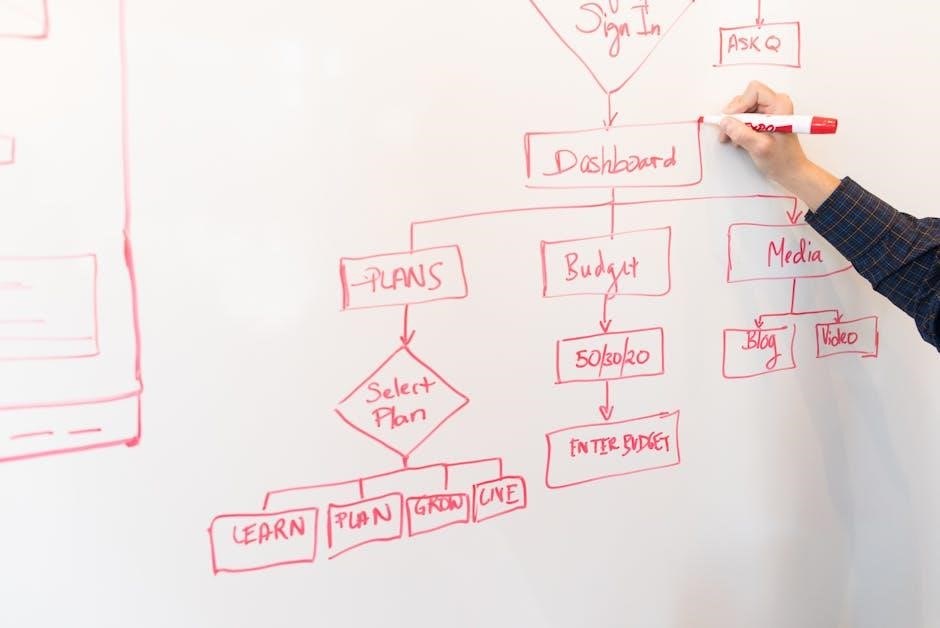LG G3 Instruction Manual: A Comprehensive Guide
Welcome! This 363-page PDF manual, in English, details the LG G3 smartphone’s features, setup, and operation. It’s your essential tutorial for specs and troubleshooting.
Unboxing and Initial Setup
Carefully unpack your LG G3, ensuring all components are present. Verify the box contains the phone itself, a battery (potentially separate, depending on the model), a charger, a USB cable, a headset, and this user manual. Before discarding packaging, double-check for all included items.

Initial setup involves inserting the SIM card and, if applicable, a microSD card for expanded storage. Power on the device by holding the power button. Follow the on-screen prompts to select your language, connect to a Wi-Fi network, and sign in to your LG account or create a new one. The LG ThinQ app installation may be prompted during this process, enhancing device functionality.
Complete the setup by restoring data from a previous device or choosing a fresh start.
Device Overview: Key Features and Components
The LG G3 boasts a sleek design housing a powerful processor and a vibrant display. Key features include its 5.5-inch QHD screen, delivering stunning visuals. The rear of the device features the camera lens, flash, and laser autofocus system for enhanced image clarity.
Essential components are strategically placed: the power/lock button resides on the rear, alongside the volume rocker. The bottom edge houses the micro-USB port for charging and data transfer, and the 3.5mm headphone jack. The SIM/microSD card tray is typically located on the side, accessible with a SIM ejector tool.
Explore the intuitive user interface and customizable settings to personalize your LG G3 experience. The LG OLED evo G3 offers a premium viewing experience.
Understanding the Display
The LG G3 features a stunning 5.5-inch QHD display, renowned for its clarity and vibrant colors. This high-resolution screen delivers an immersive viewing experience for photos, videos, and games. Understanding display settings is crucial for optimal use.
The LG OLED evo G3, a newer model, showcases a record-breaking 3000 nit brightness, but the G3 still offers excellent visibility. The display utilizes LG’s Nano IPS technology, enhancing color accuracy. Motion sensors, like those in the G3, can automatically adjust screen settings.
Explore options for adjusting brightness, contrast, and color temperature to suit your preferences and ambient lighting conditions. Familiarize yourself with the touchscreen gestures for seamless navigation.

Screen Brightness and Contrast Adjustment
Adjusting screen brightness and contrast on your LG G3 is essential for comfortable viewing in various lighting conditions. Access these settings through Settings > Display > Brightness. Increasing brightness enhances visibility outdoors, while decreasing it conserves battery life indoors.

Contrast controls the difference between the lightest and darkest parts of the image. Higher contrast provides a more vivid picture, but excessive contrast can appear unnatural. Experiment to find a balance that suits your preferences.
The LG OLED evo G3 boasts exceptional brightness (3000 nits), but the G3 still offers a wide range of adjustment. Consider enabling ‘Adaptive Brightness’ which automatically adjusts based on ambient light. Remember, optimal settings depend on personal preference and viewing environment.
Navigating the Touchscreen Interface
The LG G3 utilizes a responsive touchscreen interface for intuitive control. Basic gestures include tapping to select, swiping to scroll, and pinching to zoom. The home screen displays app icons and widgets, customizable to your liking. Swipe left or right to access additional home screen panels.
A downward swipe from the top reveals the notification panel, providing quick access to alerts and settings. The navigation bar at the bottom typically includes Back, Home, and Recent Apps buttons; Explore the settings menu (Settings icon) to personalize your experience.
For models with motion sensors (like the G3), screen activation can be gesture-based. The LG ThinQ app integration further enhances control. Familiarize yourself with these gestures for seamless navigation.
Making Calls and Managing Contacts

To initiate a call on your LG G3, tap the Phone icon. You can dial a number directly using the keypad or select a contact from your address book. The Contacts app allows you to store and organize contact information, including names, numbers, email addresses, and more.
Adding a new contact is simple: tap the “+” icon and enter the details. Contacts can be synchronized with your Google account for backup and accessibility across devices. The phone app also features a recent calls log, displaying incoming, outgoing, and missed calls.
Utilize the search function within the Contacts app to quickly locate specific individuals. The LG G3 supports call waiting and call forwarding features, configurable within the phone settings.
Messaging: SMS and MMS
The LG G3’s Messaging app facilitates sending and receiving both SMS (Short Message Service) and MMS (Multimedia Messaging Service) messages. To compose a new message, tap the “New message” icon. Enter the recipient’s phone number or select from your contacts list.
Type your message in the text field. To send a picture, video, or audio file (MMS), tap the “+” icon to attach media. Messages are displayed in conversation threads, making it easy to follow exchanges. You can manage your messages by deleting, archiving, or blocking senders.

Customize notification sounds and settings within the Messaging app’s options. The LG G3 supports group messaging, allowing you to send messages to multiple recipients simultaneously.
Connecting to Networks: Wi-Fi and Mobile Data
The LG G3 offers seamless connectivity through both Wi-Fi and mobile data networks. To connect to Wi-Fi, navigate to Settings > Network & Internet > Wi-Fi. A list of available networks will appear; select your desired network and enter the password if prompted.
For mobile data, ensure your SIM card is properly inserted and activated. Access Settings > Network & Internet > Mobile network to enable or disable mobile data. You can also manage data usage and set data limits within these settings.
The LG G3 supports various mobile network standards. Ensure your device is compatible with your carrier’s network for optimal performance. Roaming options are also available within the Mobile network settings.
Camera Functionality: Taking Photos and Videos
The LG G3 boasts a high-resolution camera for capturing stunning photos and videos. To launch the camera, tap the Camera icon on your home screen. The interface provides options for switching between photo and video modes.
Tap the shutter button to take a photo, or the record button to start recording a video. Utilize the on-screen controls to adjust settings like flash, zoom, and focus. Explore various camera modes, including panorama, HDR, and burst shot, for enhanced creativity.
Access advanced settings via the settings icon to customize resolution, aspect ratio, and other parameters. Review captured media in the Gallery app, where you can edit, share, and delete your photos and videos.

Camera Settings and Modes

Dive into the LG G3’s camera settings for personalized control. Access these via the settings icon within the camera app. Adjust photo resolution for desired image quality – higher resolution means larger file sizes. Choose aspect ratios to suit your preferences, like 4:3 or 16:9.
Explore shooting modes: Auto for effortless capture, Manual for complete control over ISO, white balance, and shutter speed. HDR enhances dynamic range, while Panorama creates wide-angle shots. Burst mode captures a rapid sequence of photos, ideal for action shots.
Further settings include grid lines for composition, location tagging, and volume key functionality. Experiment with these options to unlock the full potential of your LG G3 camera.
Using the Front-Facing Camera
The LG G3’s front-facing camera is perfect for selfies and video calls. Launch the camera app and switch to the front camera using the camera switch icon – typically represented by rotating arrows. Ensure adequate lighting for optimal image quality.
Utilize gesture controls for hands-free selfies; a simple hand gesture can trigger the shutter. Explore beauty modes to enhance your appearance with skin smoothing and face slimming effects. Adjust the flash settings for brighter selfies in low-light conditions.
Experiment with different angles and backgrounds to capture unique self-portraits. Remember to maintain a stable hand or use a tripod for sharper images. The front camera is also ideal for video conferencing with apps like Skype or Zoom.
Sound and Multimedia
The LG G3 offers a rich multimedia experience. Adjust volume levels using the side-mounted volume rocker, or through the settings menu for granular control. Explore sound profiles – Normal, Clear Voice, Bass Boost, and Custom – to tailor audio to your preferences.
Play music and videos stored locally or stream content from online services. Supported audio formats include MP3, WAV, and FLAC, while video formats encompass MP4, AVI, and MKV. Utilize the built-in equalizer to fine-tune audio frequencies.
Connect headphones or external speakers via the 3.5mm headphone jack or Bluetooth. The LG G3 supports various multimedia codecs for smooth playback. Enjoy immersive sound and vibrant visuals with this versatile device.
Adjusting Volume and Sound Profiles
Volume control on the LG G3 is easily managed via the physical volume rocker on the device’s side. Alternatively, access the settings menu for more precise adjustments, including separate controls for media, ringtones, and notifications.
Explore pre-set sound profiles to optimize your listening experience. Choose from options like ‘Normal’ for balanced audio, ‘Clear Voice’ to enhance speech clarity, ‘Bass Boost’ for richer lows, and ‘Custom’ to create a personalized sound signature using the built-in equalizer.

Fine-tune the equalizer settings to adjust specific frequency bands, tailoring the sound to your individual preferences and the type of content you’re enjoying. Experiment to find the perfect audio balance!
Playing Music and Videos

The LG G3 supports a wide range of audio and video formats. Access your stored media files through the pre-installed music and video player apps. These apps offer basic playback controls, playlist creation, and folder browsing.
To enhance your experience, consider utilizing third-party media player applications available through the LG app store. These often provide advanced features like subtitle support, audio equalization, and network streaming capabilities.
The device’s vibrant display makes watching videos a pleasure. Adjust brightness and contrast settings for optimal viewing in different lighting conditions. Enjoy seamless playback of your favorite music and movies!
LG ThinQ App Integration
The LG ThinQ app seamlessly connects your LG G3 to a broader smart ecosystem. Download and install the app on your smart device to unlock remote control features and smart home integration capabilities. Through ThinQ, you can monitor device status, adjust settings, and receive notifications.
Follow the on-screen instructions during app installation to establish a secure connection between your smartphone and compatible LG appliances. This integration allows for convenient control of your smart home devices directly from your G3.
Explore the app’s features to discover personalized recommendations and automated routines, enhancing your overall smart living experience. ThinQ simplifies managing your connected world!
Security Features: Lock Screen and Biometrics
Protect your personal information on the LG G3 with robust security features. Customize your lock screen with a PIN, pattern, or password for initial access. Enhance security further by enabling biometric authentication, if available on your model.
Explore options for fingerprint scanning or facial recognition within the settings menu. These methods offer a convenient and secure alternative to traditional passwords. Regularly update your security credentials to maintain optimal protection.
The LG G3 also provides options for remote device locking and data wiping in case of loss or theft, safeguarding your sensitive data. Prioritize strong security measures to ensure your privacy and peace of mind.
Battery Management and Charging
Maximize your LG G3’s battery life with these helpful tips. Avoid extreme temperatures, as heat and cold can degrade battery performance. Adjust screen brightness and shorten the screen timeout duration to conserve power. Close unused apps running in the background to minimize battery drain.
Utilize the phone’s built-in battery saver mode to extend usage time when needed. When charging, use the provided LG charger and cable for optimal results. Avoid overcharging; once fully charged, disconnect the device.
Consider enabling adaptive battery features, if available, to learn your usage patterns and optimize power consumption. Regularly check battery usage statistics to identify power-hungry apps.
Troubleshooting Common Issues
LG G3 experiencing issues? First, try a simple restart – often resolves minor glitches. If the screen freezes, perform a forced restart by holding the power button. For app crashes, clear the app’s cache and data in settings. Network connectivity problems? Check Wi-Fi and mobile data settings, and restart your router.
If the touchscreen is unresponsive, ensure it’s clean and dry. Battery draining quickly? Review battery usage statistics and close unused apps. Sound issues? Check volume levels and headphone connections.
For persistent problems, consult the online LG support resources or consider a factory reset (remember to back up your data first!).
Software Updates and Maintenance
Keeping your LG G3 software updated is crucial for optimal performance and security. Regularly check for updates via LG ThinQ app or within the phone’s settings (Settings > About phone > Software update). Updates often include bug fixes, performance improvements, and new features.
Periodically clear unnecessary files and apps to free up storage space. Utilize the built-in storage manager to identify and remove large or unused files. Consider using a task manager to close background apps consuming resources. Regularly backing up your data is essential before any major software update or maintenance procedure.
Ensure the LG ThinQ app is also updated for seamless integration.
Factory Reset and Data Backup
Before performing a factory reset, absolutely back up your important data! A factory reset erases all personal information from your LG G3, restoring it to its original factory settings. Back up contacts, photos, videos, and other files to LG Cloud, a computer, or an external storage device.
To initiate a factory reset, navigate to Settings > General > Backup & reset > Factory data reset. Follow the on-screen prompts, understanding this process is irreversible without a backup. This is useful for resolving persistent software issues or preparing the phone for resale.
Regular backups, even without planning a reset, are vital for data protection against unforeseen circumstances. Utilize the LG ThinQ app for convenient cloud backup options.
Warranty Information and Support
Your LG G3 is covered by a limited warranty, typically offering 1 year for both parts and labor, starting from the original purchase date. This warranty protects against manufacturing defects under normal use. Damage caused by misuse, accidents, or unauthorized modifications is not covered.
To initiate a warranty claim, register your device and request a repair through the official LG support website. You’ll need your proof of purchase and device serial number. Extended warranty options may be available for purchase, providing longer-term coverage.
For additional support, including FAQs, troubleshooting guides, and contact information, visit ManualPDF.in or the official LG website. LG also offers repair request services online.










